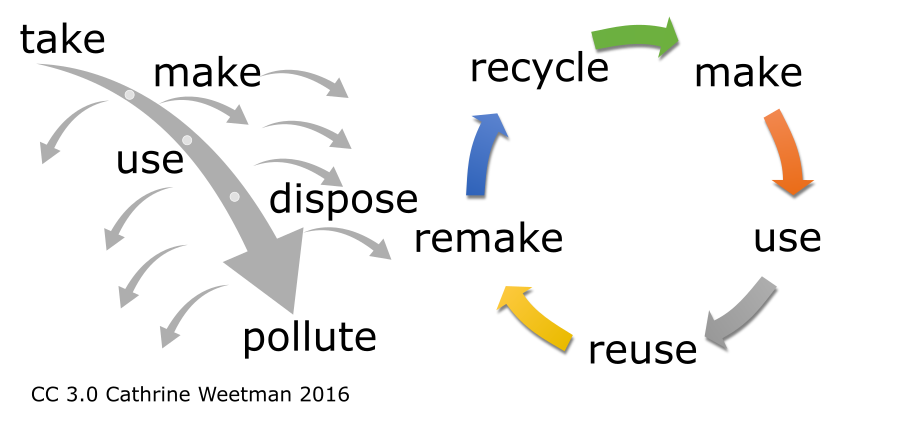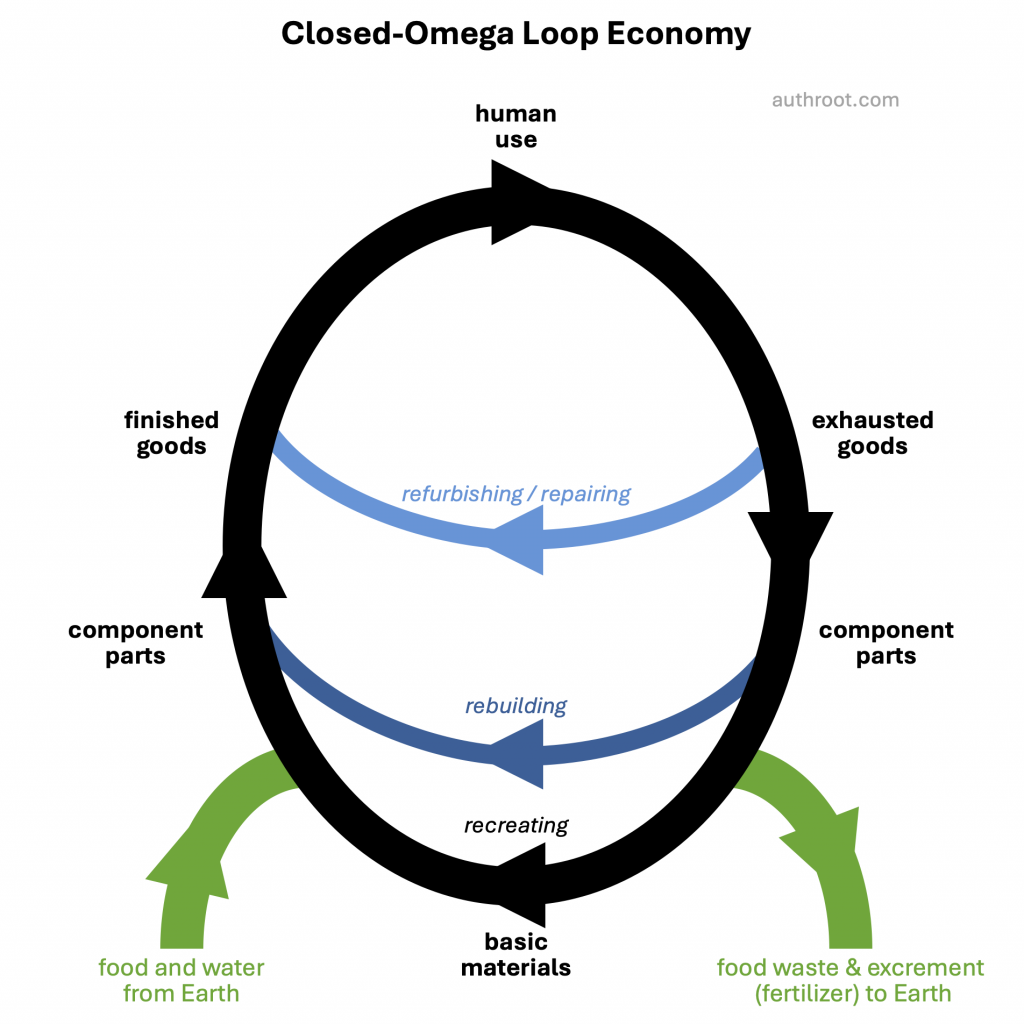In our current economic model, we extract minerals, liquids, gasses, plants, and animals from the environment; process them heavily, sending waste to the environment; and then consume them. We then toss all the used products together and burn or bury them, contaminating the places where we do this.
In other words we have a linear economic model: we extract valuable resources, and we produce harmful trash. This is an inherently self-destructive cycle: a runaway course of consumption similar to cancer or an invasive pest. So what would a regenerative economy look like?
We have already extracted vast resources from the Earth. Now that those materials are out of the ground, our most straightforward approach would be to move toward a circular economy. In this model, we would adjust the nature of our economy, our products, and our usage patterns so that the materials in exhausted products get efficiently cycled back into usable products.

While this is a vitally necessary component of a sustainable economic plan, it is flawed in that it completely segregates humans from nature. This path sets us on a journey in which we completely lose touch with nature and thus what we consider to be our humanity. Our bodies become burdensome things that we have to maintain, and increasingly we would evolve away from our animal forms into purely-mental beings.
Some may argue that this is a lofty goal: to transcend our humanity by becoming beings of pure intellect: essentially sophisticated computer programs.
I see that goal as spiritually vacant. Taking a technological approach to transcendence puts us entirely in the realm of mind, locking us into the limitations of what can be understood by mental comprehension. Our bodies become annoyances to be gotten away from. Our reasons for compassion wither, as there is no value given to anything other than ourselves. And there is no call to spirituality that has any basis in the natural universe. An economy that values only the mind and diminishes the body, heart, and spirit is an unbalanced one that I believe is doomed to sickness.
What if there was a way we could divorce ourselves from our devastating impacts on nature without divorcing ourselves from nature entirely? There are two ways we could accomplish this change.
The simplest way is to simply shut down our economy and convert to a very technologically-simplistic lifestyle where we live off of only what the land we live on can sustainably offer us. This would mean abandoning much of our current technology, including our internet, which seems like a big step back. This way also does not provide any solution for what to do about all the resources we have already extracted. And it is likely to be impractical given the number of humans currently living on the planet.
Instead I propose the closed-omega loop style of economy (or omega loop for short). Put simply, this would mean moving to a circular economy for all of our material goods except for food. Food after all is our fundamental connection to nature: as long we are living animals, we eat and we excrete. We take in substance from nature and we return nutrients to the land. We are most in this connection when we individually take that food directly from the land we inhabit and return our nutrient-rich waste directly back to that land.

To do this, we would need a circular economy for all of our goods and also we would need to live in habitation setups where we can produce our own food from the land we live on and return our urine and feces cleanly back to that land (in ways most pioneered by permaculture designers). In this way the closed-loop of the circular economy stands firmly on those earth-connecting feet of direct agriculture and direct fertilization. This model looks like the letter omega (Ω), with its loop section fully closed… the closed-omega loop.
This model closes down all of our negative impact on our environment, and opens up a truly healthy connection to that environment. It will take not only restructuring our economy over time, but also substantially restructuring our paradigms around how we view the material world.
Like any other animal, we tend to be unconcerned with the fate of an object before or after it has served its purpose for us. Many animals use tools, and when the tool has served its purpose, the animal drops it and forgets it. We do the same: we drop an item in “the trash” and forget it exists. However, because our technology is so advanced and so out-of-scale in its relative power, we no longer have the luxury of extracting wantonly nor of forgetting our trash. The system cannot balance it.
In an omega-loop economy, we will no longer even have a concept of trash. We will have to look at all non-food, non-natural items as precious treasures owned by everyone in our society. It will be a violation of social norms to do anything that could cause the loss of those valuable resources from our economy. Each individual will have to hold in themselves the personal responsibility for returning those resources to the loop at the highest level possible.
The need for this paradigm is why we also need individuals to be directly connected to their land through their food and body waste. By having personal responsibility for their own sustenance from their own land, individuals will have the groundwork to understand how precious those refined materials are. The individuals and the culture they live in will see the intrinsic value in those finite resources as well as the potential damage of disposing of them incorrectly.
By holding this paradigm, we also build the seeds to restore our planet to its full abundant capacity. As the omega-loop economy takes hold, we naturally will want to start mining our old landfills and other trash-disposal sites to recover the precious resources we have isolated there. And through our personally-connected stewardship of our own food systems, we will be highly motivated to nurture the health of the natural ecosystems around us.